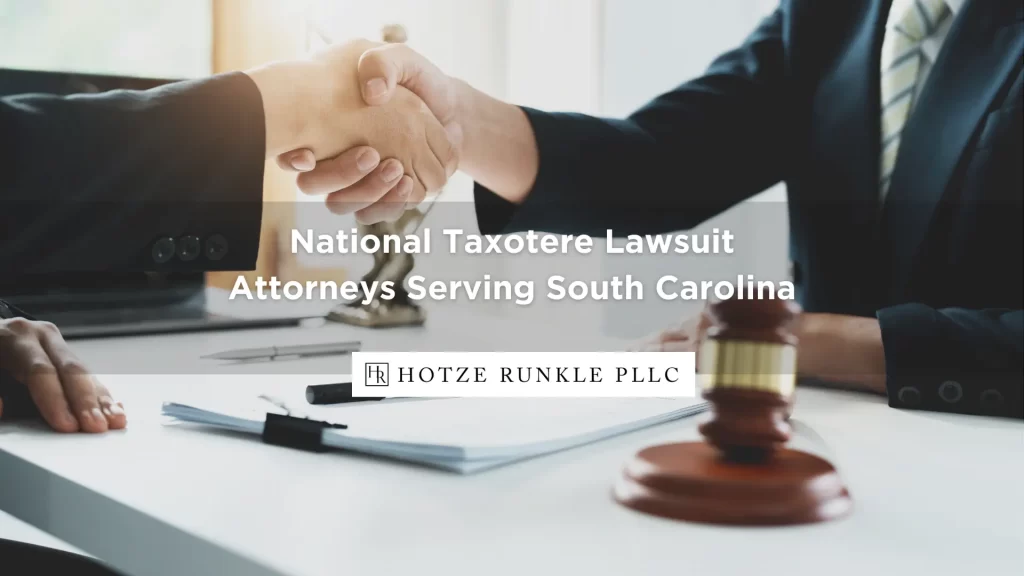
Do you suffer from severely dry, watery eyes as a result of your cancer treatment? If so, it’s possible you have developed canalicular stenosis as a result of taking the chemotherapy drug, Taxotere. If that’s the case, you’re not alone—and you could be owed significant compensation for your injuries.
The South Carolina attorneys at Hotze Runkle PLLC are pursuing litigation on behalf of patients all across the country who are suffering from the debilitating side-effects of Taxotere, including a serious eye condition called canalicular stenosis.
If you are one of those victims, it’s vital that you begin the litigation process against the drug manufacturer, Sanofi-Aventis, as soon as possible. The manufacturer failed to warn doctors and patients about the severe and sometimes permanent side effects of the treatment, which, in most cases, could have been treated if detected early on.
If you have developed teary, watery eyes following chemotherapy treatment, then take our Case Quiz to find out if you qualify for a Taxotere lawsuit today.
What is Taxotere?
Going through breast cancer is one of the most overwhelming and challenging things a person can navigate. We know that fighting cancer is an everyday battle, affecting your stamina, your mental health, and your overall quality of life. If you are going through treatment for cancer, you shouldn’t have to also worry about permanent side effects from the treatment drug itself.
Docetaxel (or Taxotere) is an anti-cancer chemotherapy medicine used by thousands of cancer patients. While the drug has helped some individuals with their cancer, it’s also inflicted some of its patients with another serious medical condition called canalicular stenosis. Canalicular stenosis is a preventable condition that, if known about early on, can be treated during your Taxotere treatment. If unchecked, canalicular stenosis can only be treated by an expensive surgery that comes with its own complications.
There are currently over 8,000 pending lawsuits filed against Sanofi-Aventis due to false marketing and Taxotere’s excessive side-effects. Taxotere has been used to treat cancer patients since 1998, but it wasn’t until 2014 that Sanofi-Aventis released a full warning list of Taxotere’s potential complications, including canalicular stenosis. If given the proper notification, medical professionals and patients could have prevented the permanent side effect of Taxotere with careful monitoring, or they would have chosen different chemotherapy drugs, altogether.
What is Canalicular Stenosis?
The chemotherapy drug, Taxotere, is administered intravenously to thousands of cancer patients every day. Unfortunately, Taxotere also comes with a whole list of excessive and painful side-effects. One of the side-effects caused by taking Taxotere is epiphora, a condition in which an individual’s eyes continuously tear up.
Your tears travel from your tear ducts to your nasal cavity along pathways called Canaliculi. When your Canaliculi become obstructed, tears will build up and stream excessively from your eyes. And this, in turn, can lead to an infection.
When the Canaliculi pathways become fully obstructed and close, this leads to canalicular stenosis. Canalicular stenosis is a serious condition that causes excessive tearing, swelling around the eyes, and blurred vision. Those with canalicular stenosis have a difficult time driving, reading, wearing makeup, and generally going about their regular routines. In the case of canalicular stenosis, these side efffects may become permanent.
What’s especially painful for victims is that, when the condition is diagnosed soon enough, doctors can insert a bicanalicular silicone stent into the eye. The stent stops excessive tearing, and can prevent canalicular stenosis from developing in the first place.
Taxotere Can Cause Canalicular Stenosis
Most patients using Taxotere receive the chemotherapy drug on a weekly basis, but others may take it less regularly. Even those patients that do not take Taxotere often, or those that finished their treatment entirely, can be at risk for developing canalicular stenosis. For many patients, the watery eyes associated with canalicular stenosis came about after completing chemotherapy treatment.
For patients taking Taxotere, canalicular stenosis is not the only eye-related side-effect to be worried about.
Additional eye-related complications include the following:
- Clouded vision
- Swollen eyelids
- Headaches and migraines
- Dry and itchy eyes
- Sensitivity to light
- Loss of vision
We use our eyes for pretty much every task. When our eye health is threatened, so is our quality of life.
It’s important to remember that canalicular stenosis, and all of the other eye-related side-effects caused by taking Taxotere, are entirely preventable. If you or a loved one is suffering from canalicular stenosis or any other eye-related side-effect after taking Taxotere, it’s crucial to contact a South Carolina Taxotere lawyer today.
How is Canalicular Stenosis Treated?
The only treatment for canalicular stenosis is an expensive and invasive medical procedure called Dacryocystorhinostomy.
A dacryocystorhinostomy is done to remove the excess mucus and fluid that have clogged up your pathways. It begins by removing the bone nearest the nasolacrimal sac, the area that tears normally drain into. The next step is to move the sac in order to create a new pathway. If the surgery is successful, the new pathway will allow the tears to drain directly into the nasal cavity, bypassing the obstructed duct.
Just like any medical procedure, Dacryocystorhinostomy comes with its own potential complications, and there are always risks related to undergoing sedation.
Dacryocystorhinostomy can cause the following side-effects:
- Facial scarring
- Blood hemorrhaging
- Abnormally fused nose tissue
- Brain fluid leakage
- Sinusitis and other infection
- Potential blindness
Additionally, if the surgery doesn’t work as intended, patients may need to undergo future surgeries to correct the complications caused by the dacryocystorhinostomy.
Again, all of these procedures are entirely preventable. If Sanofi-Aventis had done their due diligence and notified users of Taxotere of the potential side-effects from taking the drug, thousands of people would not be suffering from canalicular stenosis and other eye-related complications today.
Why Do I Need a South Carolina Taxotere Lawyer?
 A South Carolina Taxotere attorney can help you file your lawsuit and cover the excessive damages you have experienced from taking Taxotere. You could be eligible to receive a settlement to cover your expensive medical bills, emotional distress, lost wages, and more.
A South Carolina Taxotere attorney can help you file your lawsuit and cover the excessive damages you have experienced from taking Taxotere. You could be eligible to receive a settlement to cover your expensive medical bills, emotional distress, lost wages, and more.
Cancer treatment alone is costly. It’s entirely unfair that you also need to pay for a preventable medical condition caused by a negligent drug manufacturer. The responsible party should be held liable for causing canalicular stenosis and other serious conditions.
An experienced South Carolina Taxotere lawyer can help you navigate the complicated legal process of filing a lawsuit against a big drug company and ensure that you meet any necessary deadlines. Also, you should know that individuals that retain a lawyer receive three times as much as those that choose to go it alone.
Hotze Runkle PLLC has been working on behalf of victims of medical wrongs for over 13 years. We work alongside medical experts, investigators, legal aids, and attorneys to ensure that all of our cases are investigated from every angle. In order to file a Taxotere lawsuit, you have to collect medical evidence and find proof that the chemotherapy drug was the cause of your eye-related condition. Hotze Runkle PLLC has the experience and resources to find that evidence for you and build you a strong case.
Let an experienced South Carolina Taxotere lawyer help you financially recover from your entirely preventable medical condition and hold those at fault responsible for their negligence.
Do I Have a Claim?
If you suffered in any way from Taxotere-related complications, you may be eligible to file a claim. Taxotere users have suffered physical, emotional, financial, and mental stress from the excessive side-effects of the chemotherapy drug and deserve compensation to cover their pains.
You might worry that you won’t be eligible to file a claim if your cancer was successfully treated by taking Taxotere. It’s important to know that no matter the circumstances surrounding your cancer recovery, you are eligible to recover damages if you have suffered due to a side-effect of Taxotere. The side-effects of Taxotere are life-altering and threaten your quality of life. Let Hotze Runkle PLLC help you ease some of the financial burdens so that you can focus solely on recovery.
Sanofi-Aventis is facing over 8,000 lawsuits. The negligent drug maker is finally going to be held liable for their actions, and we want to do whatever we can to help you recover compensation for your expenses and suffering, as well.
Why Choose Hotze Runkle PLLC?
In 2007, our founders Patrick Hotze and Ryan Runkle founded Hotze Runkle PLLC with the shared commitment of helping those that have suffered at the negligent hands of others. Since that day, we have collected more than $100,000,000 in settlements for our clients. We serve clients all across America that have suffered from harmful medications manufactured by pharmaceutical companies.
Our product liability lawyers do everything we can to ensure that the victims of companies like Sanofi-Aventis can financially recover and regain their livelihoods. Let Hotze Runkle PLLC help your family get back to what’s essential and fight back against the drugmaker that caused your Taxotere-related tearing and canalicular stenosis.
Contact Us Today
If you or a loved one has suffered from the debilitating side-effects of Taxotere or another chemotherapy drug, you could be eligible for serious compensation. The South Carolina defective drug attorneys at Hotze Runkle PLLC can help you file your lawsuit and secure your financial future. We’ll hold the liable parties responsible for their negligence and make them pay for the pain and suffering they have caused thousands of cancer patients.
Take our quiz online today to see if you qualify for compensation.